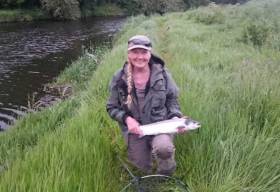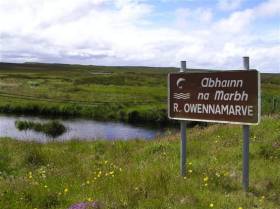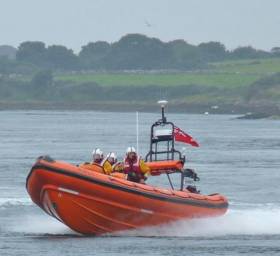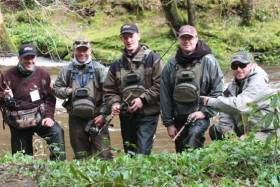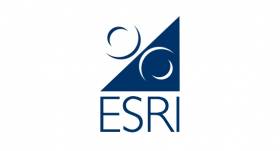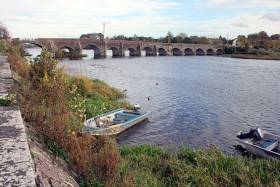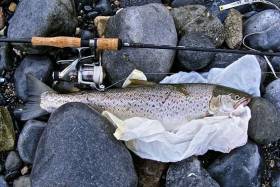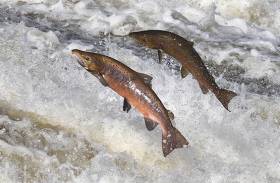Displaying items by tag: angling
Top Talent Lined Up For First North West Angling Fair
#Angling - Pauline McClenaghan and Gordon Armstrong are among the celebrity anglers lined up for the inaugural North West Angling Fair in Strabane, Co Tyrone later this month.
As the Londonderry Sentinel reports, the festival will take over the Melvin Sports Complex on the River Mourne on Saturday 28 and Sunday 29 May and give visitors an opportunity to see some of the world's best fly-casters and fly-dressers in action.
Also in attendance will be world champion fly-caster Andrew Toft from Glasgow, Mooney Goes Wild contributor Ken Whelan and Scottish casting instructor and ghillie Scott Mackenzie. The Sentinel has more HERE.
In other angling news, anglers taking part in the Waterways Ireland-sponsored Classic Fishing Festival in Fermanagh last weekend were forced to abandon a fishing stand due to an overflow of sewage into Lower Lough Erne, according to the Fermanagh Herald.
While organisers moved to accommodate competitors elsewhere, it has since emerged that the overflow near Killadeas was one of several discharged permitted by NI Water, though none affected the festival's other fishing sections.
#Angling - A retired shellfish farmer was convicted of poaching fish from the Owennamarve River near Dungloe in July 2014 at a recent sitting of Dungloe District Court.
Jimmy Sweeney was ordered to pay €800 in a fine and costs.
The court was told that Inland Fisheries Ireland (IFI) officers saw Sweeney using a fishing engine for the capture of salmon and possessing a net for taking prohibited fish from the Owennamarve River.
The defendant denied the offence but did not give evidence to the court. His defence solicitor failed in a bid to satisfy the court that there was a fault in the way Sweeney was cautioned by the officers.
IFI officer Seamus Bradley, who patrolled the area of Derrydruel Upper, Dungloe with two other officers on 15 July 2014, told the court that he spotted a net on the river with binoculars and a telescope.
He then saw a man walking downstream towards the net and stopping at it before concealing himself behind a rock close to the net. Some minutes later then man reappeared and began retrieving the net and putting it into a bag.
Bradley testified that he contacted his fellow officers at that stage and asked them to move and contact the man he was observing. When the man noticed the officers’ jeep, he went downstream and placed a bag behind a large rock.
IFI officer Owen Kelly was informed of this and recovered the bag from behind the rock. It contained a 12m-long multi-monofilament salmon net.
IFI chief executive Dr Ciaran Byrne commented: “The Owennamarve River, a private fishery owned by the Rosses anglers, has been closed since 2006 for salmon fishing and capture of sea trout over 40cm.
"Salmon angling is extremely valuable to the tourism industry and provides revenue, employment to local communities, as well as recreation to thousands of local anglers around Ireland. Inland Fisheries Ireland will continue to work to protect this resource for the good of the community.”
IFI has a confidential hotline number to enable members of the general public to report incidents at 1890 34 74 24 or 1890 FISH 24. This phone line is designed to encourage the reporting of incidents of illegal fishing, water pollution and invasive species.
#RNLI - Portaferry RNLI's volunteer lifeboat crew were called out yesterday afternoon (Sunday 17 April) to assist a 36ft angling vessel which had run into difficulty north of the South Rock Light Buoy near Portaferry, Co Down.
The alarm was raised just before 12.25pm and the lifeboat was dispatched to the scene, some 10 miles east of the lifeboat station.
The angling boat, with three people on board, had developed engine problems in what were described as calm conditions with a Force 3 wind and a slight sea swell.
When on scene, the lifeboat crew checked everyone was okay before taking the vessel under tow to Portavogie, arriving there at 2pm. The lifeboat was back on station at 2.30pm.
Commenting on the callout, Portaferry RNLI lifeboat operations manager Brian Bailie said: "This was a fairly routine callout for the lifeboat crew and we were glad to be able to offer assistance.
"However as we approach the busy season and more people are taking to the water for leisure we would advise the public to make sure they check all their equipment is in proper working order."
The RNLI offers sea safety advice online at RNLI.org/RespectTheWater
Ireland's Bass, Pike & Trout Policies Set For Review
#Angling - Inland Fisheries Ireland (IFI) has confirmed that it is in the process of reviewing the national policies for the management of bass, pike and trout.
The policies were launched by IFI in August 2014 and have a three-year review cycle.
IFI has commenced the process of examining all relevant and appropriate data to inform the review of these policies. This process was initiated in January 2016 and includes the examination of:
- The current stock management programme, including resource usage, fish transfer and health and safety.
- Marketing and socio-economic information to include actual and potential economic value.
- Scientific information to provide advice and to consider the scientific merits of the processes being currently undertaken.
An important element of each review will be a public consultation process which will be announced later in 2016. The consultations will ensure that anglers and other stakeholders have sufficient time to consider the existing policies and make submissions that will inform their review.
IFI chief executive Dr Ciaran Byrne said: “The public consultation element of the reviews presents an excellent opportunity for the 273,600-strong community of Irish anglers to engage with IFI and will ensure that the decision-making process becomes better informed, more rigorous and more accountable.
"IFI is committed to on-going engagement with anglers and other stakeholders through public meetings, the National Inland Fisheries Forum, public consultations and our complaints, comments and compliment procedures.”
During an anglers’ demonstration at IFI headquarters in Citywest on 24 March, IFI received a petition signed by over 22,000 people from around the world, including a total of 1,032 Irish signatures.
A group of approximately 80 anglers protested against the implementation of the current Pike Policy, agreed with the Irish Federation of Pike Angling Clubs and the National Association of Recreational Anglers in 2014.
Commenting on this, Dr Ciaran Byrne added: “While the petition represents a small proportion of Irish anglers, IFI recognises the unified views of those who signed it and we have made contact with the protest organisers with a view to engaging with this diverse group of anglers. IFI appreciates that public policy-making can be enhanced through the active involvement and contribution of all stakeholders with an interest in particular policy developments.
“In recent weeks, many of the protesters have made their views known to IFI through our comments and complaints channels but IFI wishes to assure all anglers that they will have the opportunity to make a representation in the public consultation process on the Pike, Trout and Bass Policy reviews later this year.
"Furthermore, IFI is running a number of surveys in conjunction with the ESRI to ensure that we capture the views of our domestic anglers as comprehensively as possible.”
#Angling - The National Coarse Fishing Federation of Ireland (NCFFI) has announced the team to represent Ireland at the 14th World Championships for Bank Fishing with Lures.
The event, hosted in 2015 by the NCFFI on Craigavon Lakes, will this year take place on the River Poprad in Slovakia in May.
Tomasz Kurman will manage and captain the team that includes Jacek Gorny, Colin Rutherford, Lindsay McFadden, Andrew Powell and reserve David Dennis, with Steven Powell as delegate.
The angling team was chosen through a process of qualifiers over the weekend of 2-3 April on the River Cusher in Co Armagh, chosen in order to replicate as much as possible the conditions to be expected in Slovakia.
Unfortunately the river was in full flood and very fast flowing but it highlighted the specific skills of the anglers who need to be able to deal with all conditions.
Kurman commented: “I am pleased to say that after a tough qualification process on a flooded and very fast flowing River Cusher, we were able to form a strong motivated team, eager to mark their position on the world stage for Ireland alongside the best lure anglers in the world.
"In addition I would like to make a specific mention of three anglers who put up a great fight during the qualifiers, namely Arvydas Mencinskas, Cristian Cacovean and Guntars Vaivads who finished with 66.5 points and in joint fifth place alongside David Dennis and Andrew Powell, all having caught the one fish during the qualifiers.
"Andrew was selected for the final position on the team as his fish was caught during Leg 6 when no other angler caught. Due to FIPS-ed passport eligibility restrictions and the fact that David Dennis represented us in 2014 he was chosen as the reserve. Along with Steven Powell who travels as team delegate their previous experience of world championship events will be invaluable to us on the bank.
"Thank you to all competitors who entered the qualifiers, our members and stewards who made it a flawless event, DCAL Fisheries and Armagh City, Banbridge & Craigavon Borough Council I would also like to take this opportunity to thank the team sponsors Vass Waders & Rainwear and Main Irish Angling along the NCFFI for their continued support.”
The NCFFI, a voluntary body, is a member of the Angling Council of Ireland and is the national governing body for coarse and predator angling recognised by Sport Ireland and Sport Northern Ireland.
Inland Fisheries Ireland (IFI) has today announced the allocation of €50,000 to the Midlands Fisheries Fund (MFF), a funding scheme set up to support sustainable fishery development projects in the Midland Fisheries Group area.
The scheme was created in 2013 and is funded through angler contributions set-aside from the permit income received by IFI in the Midland Fisheries Group permit area. For 2016, the Board of IFI has allocated an additional €10,000 to the Fund which will be available to individuals and businesses for product development and to market and promote angling in the Midland Fisheries Group permit area.
Applications are now invited to support projects which seek to increase angler accessibility to fisheries, develop and install new fishing stands, tackle terrestrial invasive species, and to provide funding to the additional categories of product development and the marketing and promotion of angling activities in the Midlands.
Dr Ciaran Byrne, CEO of Inland Fisheries Ireland, said: “The National Strategy for Angling Development has identified a number of action measures which require prioritisation. These include stakeholder engagement, sustainable development of the angling resource, marketing and promotion, and the facilitation of increased access for angling to all.
“The Midlands Fisheries Fund will allow for projects to be developed and undertaken by anglers and communities which improve their inland fisheries resource. Essentially, the money for the scheme is raised locally through the sale of fishing permits and is then injected back into the catchments, increasing revenues to communities and creating jobs. In this way, funds raised in the locality stay in the locality.”
The closing date for applications is 20th May 2016. Full details of the Midland Fisheries Fund and the application form can be obtained on the Inland Fisheries Ireland website here
Appeal To Anglers For ESRI Survey Panel
#Angling - The Economic and Social Research Institute (ESRI) is undertaking research on the socio-economics of inland fisheries within Ireland, with the objective of providing evidence that will support policy decisions regarding the management of fisheries resources and angling within Ireland.
As part of that work they are currently establishing an angler survey panel. Members of the angler panel will be invited to participate in occasional short surveys to elicit their views on various topics.
The ESRI's research programme on the socio-economics of inland fisheries is financially supported by Inland Fisheries Ireland (IFI). The data and information collected will only be used for research purposes by the ESRI, will not be shared with IFI or other organisations and will only be accessible to the researchers undertaking the analysis strictly in accordance with the Data Protection Acts, 1988 & 2003.
Only research reports and papers, which contain aggregated summary analysis, will be provided to policy decision makers, including IFI. The ESRI will make its research papers publicly available for free from its website.
To become a member of the panel, sign up via the ESRI website HERE – it should take less than a minute.
For further information about the angler panel or the research programme, contact programme lead John Curtis at [email protected]
Limerick Man Convicted Of Illegal Fishing On River Shannon
#Angling - At a sitting of Killaloe District Court on Tuesday 5 April, Judge Patrick Durkan convicted a man of illegal fishing on the River Shannon at O’Brien’s Bridge in August 2015.
Joe Ahern of O’Brien’s Bridge, Co Limerick was found guilty of illegally fishing with prawns and was fined €750 and costs amounting to €1025. Ahern pleaded guilty to the offence and co-operated fully with the fishery officers.
Salmon angling on the River Shannon is currently permitted below O’Brien’s Bridge to Thomond Bridge in Limerick City under a local catch and release byelaw. Wild salmon must be returned immediately if caught and the use of prawns is prohibited under byelaw in the entire Shannon catchment.
These measures are present to protect returning wild salmon stocks, especially to large river catchments such as the River Shannon. The wild salmon populations in the Shannon River have declined in recent years.
In summarising his judgement on the case, Judge Patrick Durkan commented that fisheries were the greatest resource of this country and that fishery officers must be allowed to protect them.
Amanda Mooney, sirector at Inland Fisheries Ireland (IFI) in Limerick, said: “Anglers must adhere to conservation methods in place on our rivers as these measures are introduced to protect vulnerable stocks and provide an opportunity for rivers to recover.
"We need to work together to improve our stocks so that the wonderful resource can be passed onto the next generation. Inland Fisheries Ireland is committed to the protection of our wild salmon stocks.”
IFI has a confidential hotline number to enable members of the general public to report incidents - 1890 34 74 24 or 1890 FISH 24. This phone line is designed to encourage the reporting of incidents of illegal fishing, water pollution and invasive species.
#Angling - Inland Fisheries Ireland (IFI) has announced the establishment of the second National Inland Fisheries Forum (NIFF).
Angling federations, groups and individuals are requested to nominate candidates for membership on the forum, established under the Inland Fisheries Act 2010 to provide a mechanism to recognise the important contribution of a wide range of stakeholders to the policies of IFI and their inputs into the sector generally.
During its first term, a specific objective of the NIFF was also to ensure that this contribution was not lost when the Regional Fisheries Boards were abolished as part of the process of establishing IFI.
The initial cycle of the NIFF was launched in October 2011 and concluded its three-year term in 2014. Following a comprehensive review of its first cycle, its structure and function has been modified to enable more effective operations.
In accordance with the provision in the 2010 Act, the minister has had an input into this review process and has signed off on the revised structure.
To recognise the special role of angling stakeholders, each of the main angling organisations has been requested to nominate two of their members to represent their interests for the duration of the second cycle of the NIFF. It is anticipated that these nominees will then be appointed to the forum by the minister.
The process of selecting the remaining members of the new forum will be managed by the Public Appointment Service (PAS) with the support of IFI. The forum shall consist of not more than 60 members.
Commenting on the revised process for the appointment of members to the Forum, IFI chief executive Dr Ciaran Byrne said: “The restructured forum provides an important opportunity for all stakeholders to contribute to the development of policies in respect of the Irish inland fisheries resource.
"The combined forum membership is expected to comprise people with knowledge in the areas of recreational fisheries, environmental organisations, business, fishery owners, tourism and marketing, agriculture, aquaculture, commercial fisheries [and] heritage.
"I am confident that membership will span all appropriate sectors and regions and will lead to improved input to inland fisheries policy and future development.”
The PAS has compiled an information booklet providing additional information on the recruitment process and the next cycle of the NIFF.
New Statistics On Northern Ireland's Inland Fisheries
#Angling - Northern Ireland's Department of Culture, Arts and Leisure (DCAL) has published a digest of statistics for salmon and inland fisheries in the department's jurisdiction.
The main purpose of these statistics is to give an overview of the DCAL fisheries sector in Northern Ireland. The latest available data have been drawn together from a number of published and unpublished sources.
Some key statistics from the report include the following:
- There were 25,667 angling licences and 17,984 DCAL permits sold in 2014.
- 1,024 rod licences and 1,013 permits were checked in the DCAL public angling estate in 2014/15.
- There were approximately 361,000 salmon fry stocked from Bushmills Hatchery to rivers in Northern Ireland in 2014.
- No salmon were caught in commercial fishing nets in 2014.
- The estimated return of wild adult salmon to the River Bush in 2014 was 963 and was below the previous 10-year average (2004-2013) of 1,239.
- The 10-year overall eel catch average in Lough Neagh (2005-2014) of 399 tonnes is 35% less than the previous ten year eel catch average (1995-2004) of 612 tonnes.
- The eel escapement estimate for the Neagh-Bann River Basin District for 2014 was 253 tonnes and above the 200 tonnes target.
The bulletin is available on the DCAL website or from the Research and Statistics Branch, Department of Culture, Arts and Leisure, Causeway Exchange, 1-7 Bedford Street, Belfast BT2 7EG (Tel: 028 9081 6971; Email: [email protected]).
In other news, Northern Ireland's Culture, Arts and Leisure Minister Carál Ní Chuilín has welcomed a new platform designed to accommodate disabled anglers at Copeland Reservoir in Carrickfergus.
The concrete platform is built to a high specification and gives anglers who use wheelchairs close and safe access to the water.
“Angling is an integral part of our leisure offering not only for local people, but also for tourists," said the minister this week. "It is a very relaxing and peaceful way of passing time and unwinding in the open air, and I am committed to ensuring that wheelchair users have equal access to angling."
Minister Ní Chuilín said the new platform "is designed to ensure that wheelchair-using anglers can get as close as possible to the water’s edge, safely. There is also a car park located right beside it, further enhancing accessibility.
“There is a considerable disabled angling fraternity locally, with over 1,700 one-year disabled angling licences and 1,500 day permits being issued each year. This is a significant number, and I want to see even more disabled people experiencing the benefits of angling for themselves."
The new stand "offers disabled anglers another choice of location to fish, and visit the surrounding area. It brings to more than 30 the number of public angling estate locations which are accessible to anglers with a disability," the minister added.
“I commend staff in my department’s Inland Fisheries Group who have constructed the platform and I hope that it caters for disabled anglers for many years to come.”



























